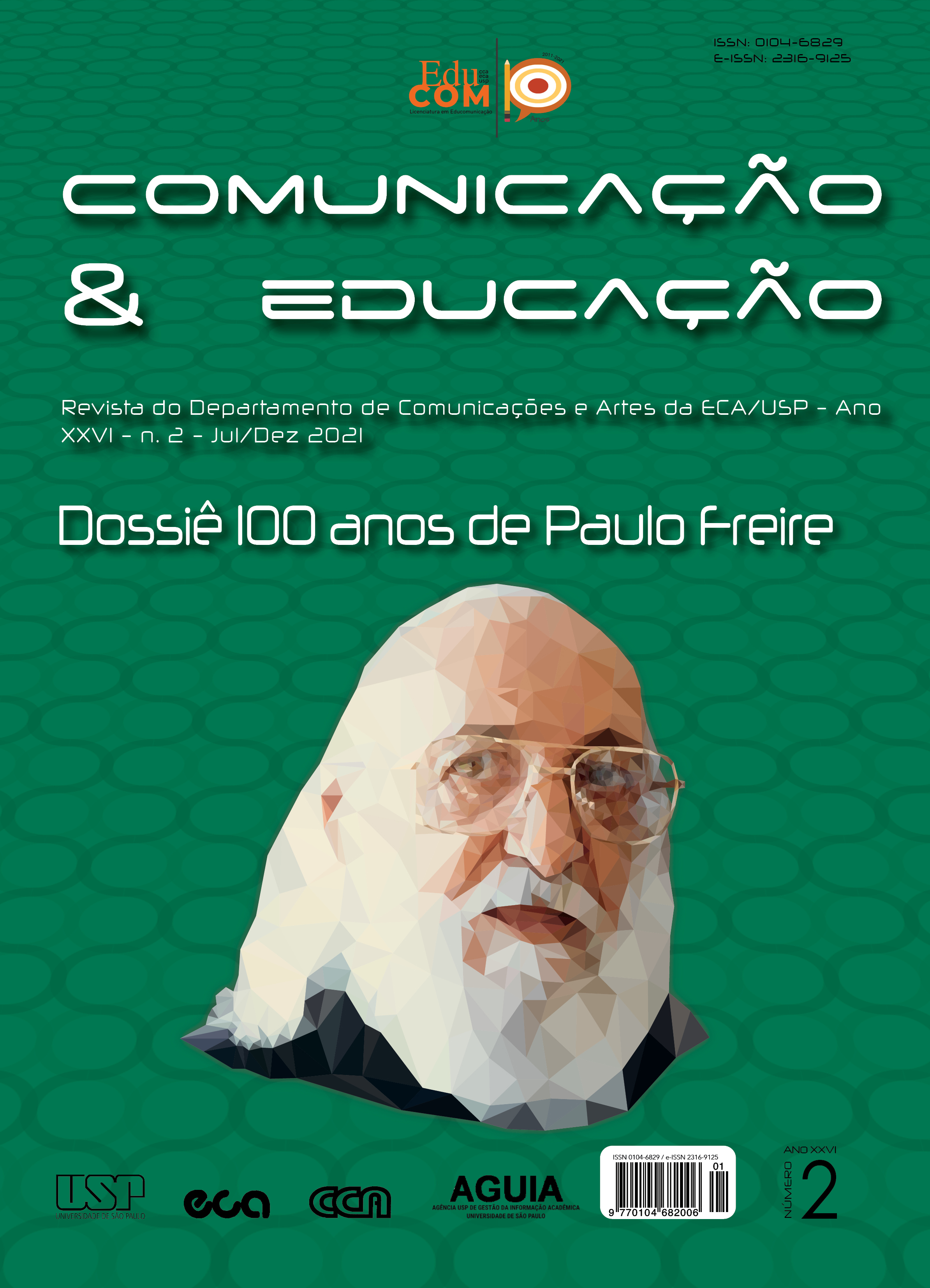An analysis of textbook content for the emancipatory literacy of adults in the postcolonial educational context. The case of the Brazilian Amazon in the 1980s
DOI:
https://doi.org/10.11606/issn.2316-9125.v26i2p134-148Keywords:
Citizenship education, Emancipatory literacy, Adult literacy, Paulo Freire, Textbook analysisAbstract
This research focuses on the notion of emancipation in textbooks inspired by the work of Paulo Freire. Those were used for adult literacy programs in the context of postcolonial education in the North of Brazil between 1960 and 1980. This study was based on the methodology of content analysis of textbooks and on literature on citizenship education. The main objective was to construct and evaluate the strength of a conceptual model of emancipatory literacy. By using three methodological steps to analyze the contents in textbooks that are favourable for the development of this type of literacy, we verified that, in the studied sample, the types of citizen orientation, towards justice or citizen participation, are part of the primary criteria that help define the contents of the textbooks that favour emancipatory literacy.
Downloads
References
ANDERSON, Lorin et al. A taxonomy for learning, teaching, and assessing: a revision of Bloom’s taxonomy of educational objectives. London: Longman, 2001.
BARDIN, Laurence. Le texte et l’image. Communication & Langages, Lyon, v. 26, n. 1, p. 98-112, 1975. DOI: https://doi.org/10.3406/colan.1975.4211.
BARDIN, Laurence. Análise de conteúdo. Lisboa: Edições 70, 1977.
BARTLETT, Lesley. Dialogue, knowledge, and teacher-student relations: freirean pedagogy in theory and practice. Comparative Education Review, Chicago, v. 49, n. 3, p. 344-364, 2005. DOI: https://doi.org/10.1086/430261.
BRANDÃO, Carlos Rodrigues. Círculo de cultura. In: STRECK, Danilo Romeu; REDIN, Euclides; ZITKOSKI, Jaime José (org.). Dicionário Paulo Freire. Belo Horizonte: Autêntica, 2015. p. 328-330.
BRANDÃO, Carlos Rodrigues. A educação como cultura. Memórias dos anos sessenta. Horizontes Antropológicos, Porto Alegre, n. 49, p. 377-407, 2017. DOI: https://doi.org/10.1590/S0104-71832017000300014.
BURBULES, Nicholas; BERK, Rupert. Critical thinking and critical pedagogy: relations, differences, and limits. In: POPKEWITZ, Thomas S.; FENDLER, Lynn (ed.). Critical theories in education: changing terrains of knowledge and politics. New York: Routledge, 1999. p. 45-65.
BUTLER, Brandon; SUH, Yonghee; SCOTT, Wendy. Knowledge transmission versus social transformation: a critical analysis of purpose in elementary social studies methods textbooks. Theory & Research in Social Education, Silver Spring, v. 43, n. 1, p. 102-134, 2015. DOI: https://doi.org/10.1080/00933104.2014.999850.
CEDI; MEB. Poronga. Cartilhas em português. Alfabetização. 2. ed. São Paulo: Cedi: MEB, 1983.
CEDI; MEB. O ribeirinho. Cartilhas em português. Alfabetização. 4. ed. São Paulo: Cedi: MEB, 1984.
CHU, Yiting. Twenty years of social studies textbook content analysis: still “decidedly disappointing”? The Social Studies, Philadelphia, v. 108, n. 6, p. 229-241, 2017. DOI: https://doi.org/10.1080/00377996.2017.1360240.
DESJARDINS, Richard. Education and social transformation. European Journal of Education, Hoboken, v. 50, n. 3, p. 239-244, 2015. DOI: https://doi.org/10.1111/ejed.12140.
FÁVERO, Osmar. A história da alfabetização de adultos em questão. TV Escola, Brasília, DF, 2003.
FREIRE, Paulo. Educação como prática da liberdade. Rio de Janeiro: Paz e Terra, 1969.
FREIRE, Paulo. Pedagogia da libertação em Paulo Freire. Rio de Janeiro: Paz e Terra, 1987.
FREIRE, Paulo. Política e educação. São Paulo: Cortez, 1993.
FREIRE, Paulo. The adult literacy process as cultural action for freedom. Harvard educational review, Cambridge, v. 40, n. 2, p. 205-225, 1970. DOI: https://doi.org/10.17763/haer.40.2.q7n227021n148p26.
HOLSTI, Ole. Content analysis for the social sciences and humanities. Reading: Addison-Wesley, 1969.
JANKS, Hilary. Critical literacy in teaching and research. Education inquiry, Umea, v. 4, n. 2, p. 225-242, 2013. DOI: https://doi.org/10.3402/edui.v4i2.22071.
KAHNE, Joseph; WESTHEIMER, Joel. Teaching democracy: what schools need to do. Phi Delta Kappan, Arlington, v. 85, n. 1, p. 34-66, 2003. DOI: https://doi.org/10.1177/003172170308500109.
LAVERE, David Bruce. The quality of pedagogical exercises in U.S. history textbooks. The Social Studies, Philadelphia, v. 99, n. 1, p. 3-8, 2008. DOI: https://doi.org/10.3200/TSSS.99.1.3-8.
ROBERTS, Scott. A review of social studies textbook content analyses since 2002. Social Studies Research & Practice, Tuscaloosa, v. 9, n. 3, p. 51-65, 2014.
ROMÃO, José Eustáquio; GADOTTI, Moacir. Paulo Freire e Amílcar Cabral: a descolonização das mentes. São Paulo: Editora e Livraria Instituto Paulo Freire, 2012.
SCOTT, Wendy; SUH, Yonghee. Standardizing the essential knowledge, skills, and attitudes for democratic life: a content analysis of Virginia standards of learning and social studies textbooks. The Social Studies, Philadelphia, v. 106, n. 3, p. 92-103, 2015. DOI: https://doi.org/10.1080/00377996.2015.1005282.
SEVIER, Brian. The creation and content of an early “multicultural” social studies textbook: learning from people of Denver. Theory & Research in Social Education, Silver Spring, v. 30, n. 1, p. 116-141, 2002.
STROMQUIST, Nelly. Freire, literacy, and emancipatory gender learning. International review of education, Hamburg, v. 60, p. 545-558, 2014. DOI: https://doi.org/10.1007/s11159-014-9424-2.
STROMQUIST, Nelly. Gender structure and women’s agency: toward greater theoretical understanding of education for transformation. International Journal of Lifelong Education, Abingdon, v. 34, n. 1, p. 59-75, 2015. DOI: https://doi.org/10.1080/02601370.2014.991524.
STROMQUIST, Nelly. Literacy and empowerment: a contribution to the debate. New York: Uneso, 2009.
TROMBETA, Sérgio. Mito. In: STRECK, Danilo Romeu; REDIN, Euclides; ZITKOSKI, Jaime José (org.). Dicionário Paulo Freire. Belo Horizonte: Autêntica, 2015. p. 337-339.
WADE, Rahima. Content analysis of social studies textbooks: a review of ten years of research. Theory & Research in Social Education, Silver Spring, v. 21, n. 3, p. 232-256, 1993. DOI: https://doi.org/10.1080/00933104.1993.10505703.
WESTHEIMER, Joel; KAHNE, Joseph. Educating the “good citizen”: political choices and pedagogical goals. PS: Political science and politics, Washington, DC, v. 37, n. 2, p. 241-247, 2004. DOI: https://doi.org/10.1017/S1049096504004160.
YOON, Bogum; SHARIF, Rukhsar. Future directions for critical literacy practice. In: YOON, Bogum; SHARIF, Rukhsar (ed.). Critical Literacy Practice. London: Springer Singapore, 2015. p. 189-192. DOI: https://doi.org/10.1007/978-981-287-567-9.
Downloads
Published
Issue
Section
License
Copyright (c) 2021 Fabricio Valentim da Silva, Marc-André Éthier, Stéphanie Demers

This work is licensed under a Creative Commons Attribution 4.0 International License.
I authorize the publication of the submitted article and soon the copyrights to the magazine, in the printed and electronic version, if it is approved after the evaluation of the reviewers.
I understand that readers may use this article without prior request, provided the source and authorship are mentioned. Readers are not authorized to use this article for reproduction, in whole or in part, for commercial purposes.

































